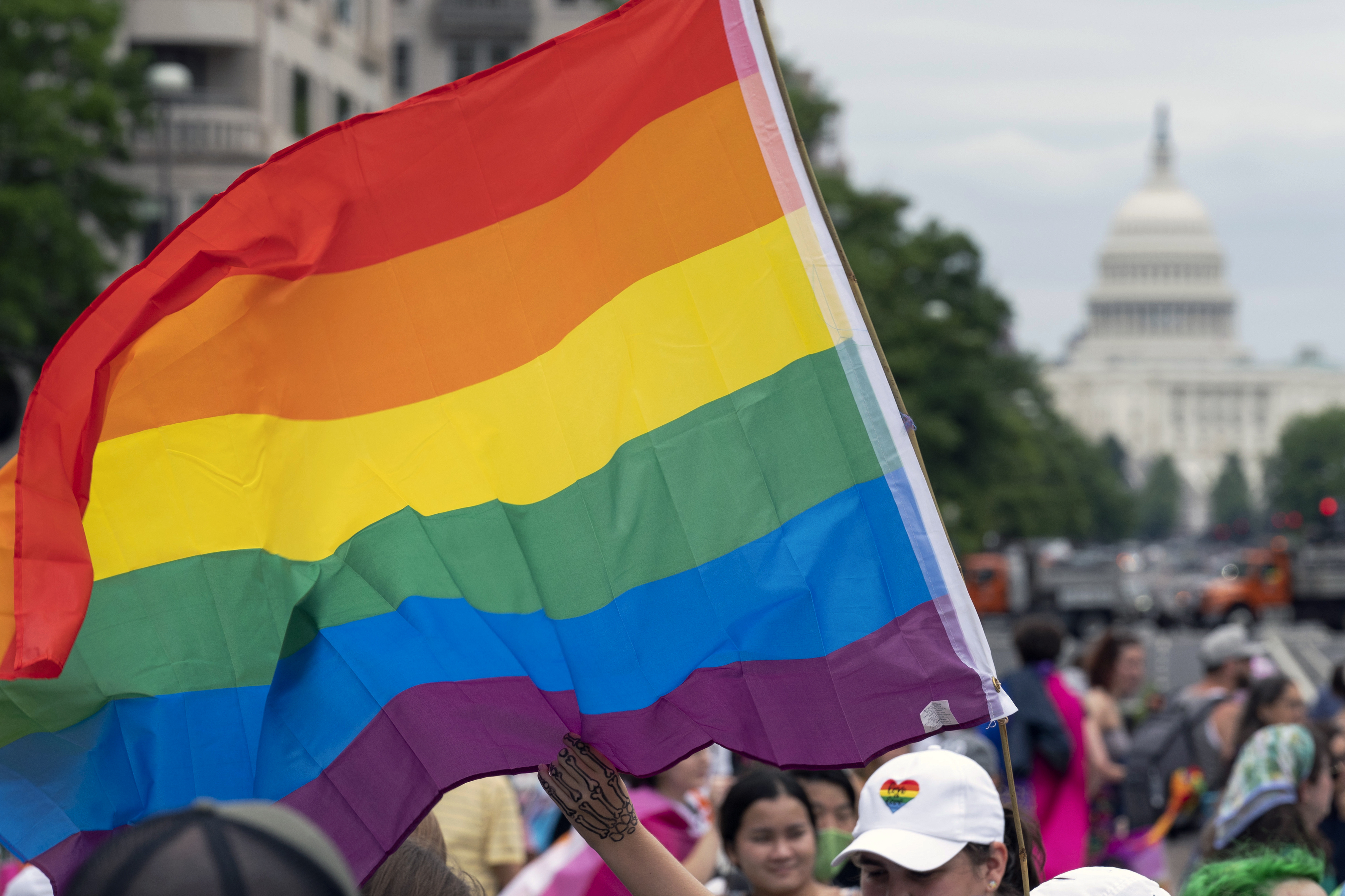
The United States Supreme Court’s conservative majority has signalled sympathy towards an evangelical Christian web designer whose business refuses to provide services for same-sex marriages.
The case pits LGBTQ rights against a claim that freedom of speech exempts artists from anti-discrimination laws.
On Monday, the justices heard more than two hours of spirited arguments in Denver-area business owner Lorie Smith’s appeal, which seeks an exemption from a Colorado law that bars discrimination based on sexual orientation and other factors. Lower courts ruled in favour of Colorado.
Smith, who runs a web design business called 303 Creative, contends that Colorado’s Anti-Discrimination Act violates the right of artists – including web designers – to free speech under the US Constitution’s First Amendment by forcing them to express messages they oppose through their work.
Smith, 38, has said she believes marriage should be limited to opposite-sex couples, a view shared by many conservative Christians. She preemptively sued Colorado’s civil rights commission and other state officials in 2016 because she feared she would be punished for refusing to serve gay married couples.
While the conservative justices indicated support for Smith’s stance, the liberal justices leaned towards Colorado’s arguments. The court has a 6-3 conservative majority.
Conservative Justice Samuel Alito asked about an instance in which someone offered customisable speeches or wedding vows.
“Can they be forced to write vows or speeches that espouse things they loathe?” Alito asked.
The liberal justices posed tough questions to Kristen Waggoner, the lawyer representing Smith. Justice Sonia Sotomayor said a ruling favouring Smith could allow a business like Smith’s to also decline to provide services if they objected to interracial marriages or disabled people getting married.
“Where’s the line?” Sotomayor asked.
Sotomayor said such a ruling would be the first time in the Supreme Court’s history that it allowed a business open to the general public to “refuse to serve a customer based on race, sex, religion or sexual orientation”.
Colorado Solicitor General Eric Olson said Smith is seeking a “license to discriminate”. Olson said her arguments would not just let a business owner decline to provide services because of a sincerely held religious belief, but also due to “all sorts of racist, sexist and bigoted views”.
Olson said the Colorado public accommodation law at issue targets the conduct of discriminatory sales by businesses like Smith’s.
“The company can choose to sell websites that only feature biblical quotes describing marriage as only between a man and a woman, just like a Christmas store can choose to sell only Christmas-related items. A company just cannot refuse to serve gay couples, as it seeks to do here, just as a Christmas store cannot announce, ‘No Jews allowed,'” Olson said.
President Joe Biden’s administration backed Colorado in the case. Deputy Solicitor General Brian Fletcher told the justices that, even if they are sympathetic to Smith’s own situation, she was seeking a “very sweeping” result that could allow businesses to reject customers on the unacceptable basis of race as well.
‘Not a riverboat’
Colorado’s law bars businesses open to the public from denying goods or services to people because of race, gender, sexual orientation, religion and other characteristics, and from displaying a notice to that effect.
Conservative Justice Clarence Thomas pressed Olsen on what historical precedent there was for allowing speech to be directly or indirectly regulated by public accommodation laws, saying that “this is not a hotel, this is not a restaurant, this is not a riverboat or train”.
Public accommodations laws exist in many states, banning discrimination in areas such as housing, hotels, retail businesses, restaurants and educational institutions.
Waggoner depicted the case as a fight against government-compelled speech, describing her client as an artist making a custom creation rather than merely offering a service. Waggoner said Colorado law forces Smith “to create speech, not simply sell it”.
Waggoner said that Smith “believes opposite-sex marriage honours scripture and same-sex marriage contradicts it. If the government can label this speech equivalent, it can do so for any speech, whether religious or political. Under Colorado’s theory, jurisdictions could force a Democrat publicist to write a Republican’s press release.”
The Supreme Court has become increasingly supportive of religious rights and related free speech claims in recent years, even as it has backed LGBTQ rights in other cases. The court legalised gay marriage nationwide in a landmark 2015 decision, and in 2020, it expanded protections for LGBTQ workers under federal law.
Liberal Justice Elena Kagan questioned why a website designer who provided heterosexual couples with a standard wedding website with names, dates, pictures and hotel information could decline to provide the exact same site to a gay couple.
“If I understand you, you’re saying, ‘Yes, she can refuse,’ because there’s ideology just in the fact that it’s Mike and Harry, and there’s a picture of these two guys together,” Kagan told Waggoner.
The case follows the Supreme Court’s narrow 2018 ruling in favour of Jack Phillips, a Christian Denver-area baker who refused on religious grounds to make a wedding cake for a gay couple. The court in that case stopped short of creating a free speech exemption to anti-discrimination laws. Like Phillips, Smith is represented by the Alliance Defending Freedom, a conservative religious rights group.
Conservative Justice Amy Coney Barrett said Waggoner was on her “strongest ground when you’re talking about her sitting down and designing and coming up with the graphics to customise them for the couple”. Barrett questioned whether the First Amendment would still protect Smith if she wanted to decline to provide a “plug-and-play” website to a gay couple that an opposite-sex couple could buy.
A ruling is expected by the end of June.







